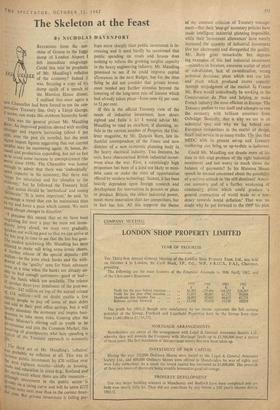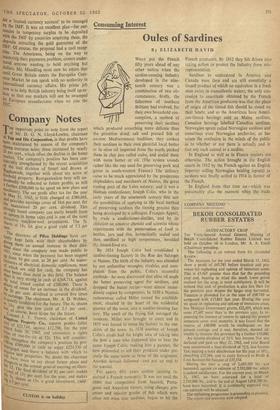The Skeleton at the Feast
By NICHOLAS DAVENPORT This was the general picture Mr. Maudling drew. An improved position abroad with sterling stronger and exports increasing (about 6 per cent. over the past six months), but the most recent import figures suggesting that our current surplus may be narrowing again. At home, de- mand and production expanding, but not so fast as to avoid some increase in unemployment (the Worst since 1958). The Chancellor was honest enough to admit that there was 'undoubtedly' spare capacity in the economy, that there was se°Pe for relaxation and for stimulus to the ecOnonly,' but he followed the Treasury brief '-that action should be 'methodical' and timing `deliberate.' It is more important,' he said, 'to encourage a trend that can be maintained than to try and force a pace which cannot. We must avoid abrupt changes in direction.' I presume this means that as we have been stagnating for over a year we must not imme- ei1a/el}, jump ahead; we must very gradually 9uieken our walking pace so that we can arrive at bus stop in time to see that the bus has gone. tne modest quickening Mr. Maudling has been allowed A to make will bring some ironic cheers. further release of the special deposits-00 '14'illion—to the joint stock banks and the with- drawal of the 'quality' tests for bank advances e at a time when the banks are already un- to to find enough customers —good or bad— „Orr the funds which are available. The release "et another three-year instalment of the post-war of million on top of the annual release elderly £18 million----will no doubt enable a few and people to pay off some of their debts hardly add nnardly stito their post office savings, but it will er!s in en to take more risks. Corning after the stimulate the economy and inspire busi- fa'aime Minister's stirring call to youth to be cosseting and join the Common Market, this y,,sieting of grandparents who hate spending is • al of the Treasury approach to economic The third act of jr.N Maudling's `reflation' as probably no reflation at all. This was to increase public investment by £70 million over the next eighteen months—chiefly in housing, roads and education in areas (e.g., Scotland and althoughe north-east) where there are idle resources— investment in the public sector is already on a rising curve and will be some £1:75 'rhos more next year than in the current (man- ia' ear. But private investment is falling per- haps more sharply than public investment is in- creasing and it need hardly be mentioned that public spending on roads and houses does nothing to relieve the growing surplus capacity in the heavy engineering industry. Mr. Maudling promised to see if he could improve capital allowances in the next Budget, but for the time being he did not consider that private invest- ment needed any further stimulus beyond the lowering of the long-term rate of interest which had already taken place—from over 6-i• per cent. to 51 per cent.
If this is the official Treasury view of the needs of industrial investment, how short- sighted and futile it is! I would advise Mr. Maudling to read an excellent, if alarming, ar- ticle in the current number of Progress, the Uni- lever magazine, by Mr. Duncan Burn, late in- dustrial correspondent of the Times and now director of a new economic planning body in the heavy electrical industry. Two features, he says, have characterised British industrial invest- ment since the war. First, a surprisingly high proportion has been of a kind not likely to mini- mise costs or make the most of opportunities offered by modern technology. Second, it has been heavily dependent upon foreign research and development for innovations in process or plant or product. Britain, the oldest industrial power, needs more innovation than her competitors, but in fact has less. All this supports the theme of my constant criticism of Treasury manage- ment—that their `stop-go' monetary policies have made intelligent industrial planning impossible, while their 'investment allowances' have merely, increased the quantity of industrial investment (for tax abatement) and disregarded the quality. Mr. Burn gives remarkable but depress- ing examples of this bad industrial investment ---mistakes in location, excessive scatter of plant or sub-division, lack of co-ordination, wrong technical decisions, plant which was too late and plant which produced excess capacity through misjudgment of the market. In France. Mr. Burn would undoubtedly be working in the Commissariat du Plan and helping to make French industry the most efficient in Europe. The Treasury prefers to run itself and attempts to run the economy with brilliant amateurs from Oxbridge. Basically, that is why we are in an industrial spot and why we lag behind our European competitors in the matter of design, finish and service in so many trades. The idea that NEDC with its present set-up and Treasury mothering can bring us up-to-date is.•lndicrous.
Could Mr. Maudling not devote more of his time to this vital problem of the right industrial investment and not worry so much 'about the balance of payments? In his Mansion House speech he seemed concerned about the possibility of a serious setback in 'the still dominant' Ameri- can economy and of a further weakening of commodity prices which could • produce 'a general contraction of world trade or a ten- dency towards world deflation.' That was no doubt why he put forward to the IMP his plan for a 'mutual currency account' to be managed by the IMF. It was an excellent plan—for cur- rencies in temporary surplus to be deposited with the IMF by countries acquiring them, the deposits attracting the gold guarantee of the IMF. Of course, the proposal had a cool recep- tion. The Americans, being on the way to mastering their payments problem, cannot under- stand anyone wanting to hold anything but dollars. Mr. Maudling must now be aware that until Great Britain enters the European Com- mon Market he can speak with no authority in international currency affairs. His prime job now is to help British industry bring itself up-to- '', ate so that our markets will not be swamped by European manufactures when we join the
tEC.







































 Previous page
Previous page